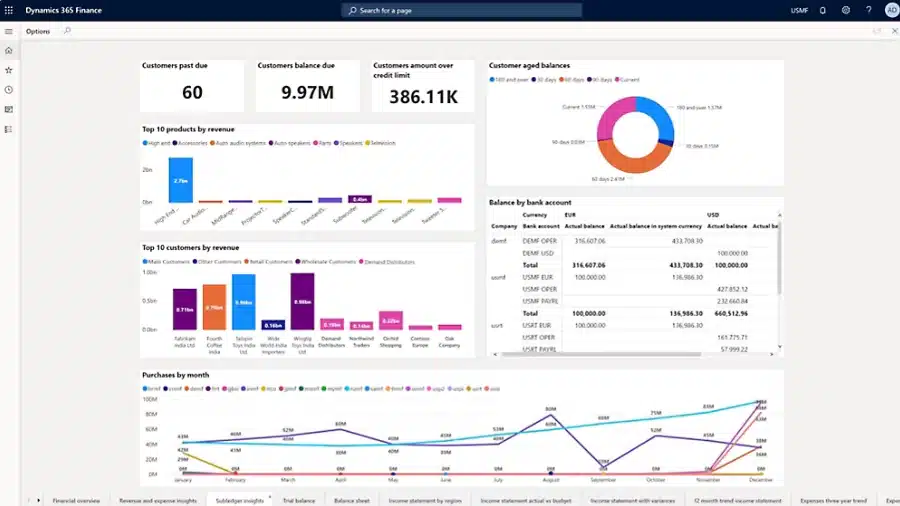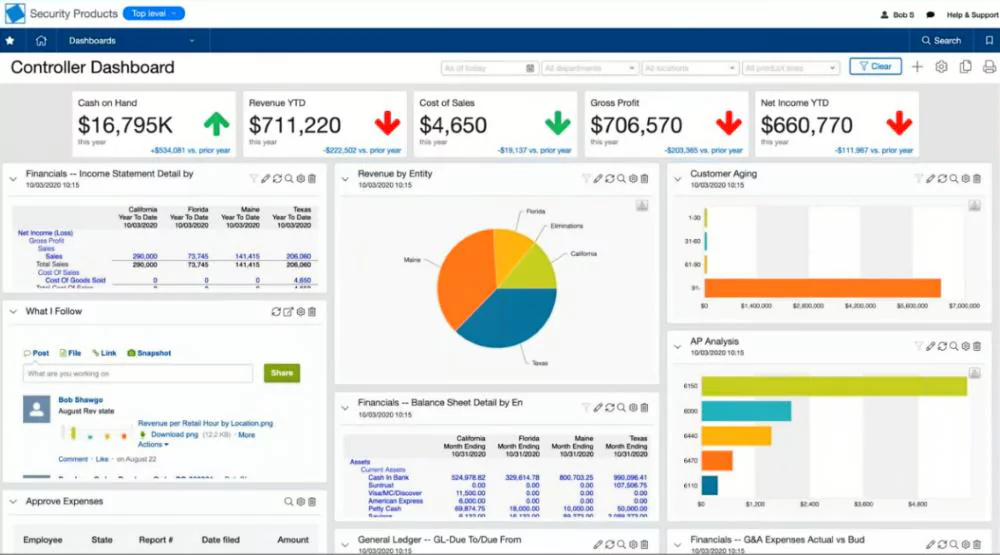Top ERP for midsize companies

Midsize businesses face the unique business challenge of balancing complexity with agility, managing growth, and navigating technology investments that deliver real ROI. ERP solutions stand as a powerful ally in this business management struggle. The right ERP can transform business processes, streamlining operations, empowering your team, and setting the stage for scaling with confidence.
In this guide, we spotlight six leading ERP solutions tailored for the mid-market: Microsoft Dynamics 365 Business Central, Dynamics 365 Finance & Operations (F&O), Oracle NetSuite, Sage Intacct, Sage 100, and Acumatica. You’ll find clear summaries of each, including standout features and benefits with a comparison table to help you assess side-by-side. Plus, you will learn why partnering with Rand Group for your ERP journey can mean the difference between just implementing software and transforming your business.
Top ERP systems for midsize companies
Microsoft Dynamics 365 Business Central
Microsoft Dynamics 365 Business Central is a comprehensive, all-in-one ERP solution designed for midsize businesses. D365 Business Central unifies financials, operations, sales, supply chain, and customer service within a single streamlined platform. Built natively in the Microsoft ecosystem, it offers seamless integrations with Outlook, Excel, Teams, and the Power Platform. This alignment enables faster adoption, boosts productivity, and allows companies to automate manual processes with minimal disruption.
For midsize companies, D365 Business Central delivers enterprise-grade functionality without the heavy overhead of larger systems. Its modular architecture allows organizations to start with core financials and expand into project management, manufacturing, warehouse management, or service operations as needs evolve. Real-time dashboards, embedded analytics, and AI-powered forecasting provide leaders with actionable insights that help them react quickly to changes in demand, costs, or performance.
Available in both cloud and on-premises deployment models, Business Central offers control over data residency, compliance, and infrastructure strategy. With Microsoft Copilot, businesses gain intelligent recommendations for cash flow management, late payment risk, and inventory optimization, empowering lean teams to make smarter decisions faster.
The system is also highly customizable. Midsize organizations can adapt Business Central to their unique workflows, industries, and security needs. This flexibility comes through low-code/no-code Power Apps or customizations delivered by trusted partners like Rand Group.
Dynamics 365 Business Central is ideal for midsize organizations that:
- Are already invested in Microsoft technologies and want tighter integration.
- Need an affordable yet scalable ERP that grows with their business.
- Value flexible deployment options and industry-specific tailoring.
- Want actionable intelligence and automation built into everyday workflows.

White Paper:
Top 10 ERP software selection checklist
This checklist covers ten critical steps to help you select ERP software and find the solution that’s the right fit for your business.
Microsoft Dynamics 365 Finance & Operations
Microsoft Dynamics 365 Finance & Operations (D365 F&O) is an advanced ERP solution designed for midsize to large organizations managing more complex operations. If your business is multi-entity or multi-national, this Microsoft solution is a perfect fit for you. As part of the Microsoft ecosystem, it integrates seamlessly with Microsoft 365, the Power Platform, and Azure services. This integration ensures consistent user experience across all business tools while enabling rich automation and advanced analytics.
For midsize companies preparing for significant growth or managing diverse business units, Dynamics 365 F&O delivers robust functionality in both finance and operations. Its financial management capabilities include global consolidation, multi-currency and multi-entity support, compliance and audit readiness, and advanced budgeting and forecasting. On the operations side, D365 F&O provides powerful tools for manufacturing, distribution, supply chain, procurement, and warehouse management. This well rounded view of operations gives decision-makers full visibility into every stage of the value chain.
AI-driven insights and embedded analytics provide finance leaders with predictive models for cash flow, revenue, and risk management. Its automation features reduce time-consuming tasks like invoice processing, reconciliations, and order management. Combined, these tools help midsize companies scale with precision while maintaining financial control.
The system’s global readiness makes it a strong choice for businesses expanding internationally. With native localization for dozens of countries, tax management, and compliance tools, D365 F&O eliminates the need for bolt-on systems.
Dynamics 365 Finance & Operations is ideal for midsize businesses that:
- Require multi-entity, multi-currency, or international capabilities.
- Need deep control over financial and operational processes.
- Operate in industries with complex supply chains or manufacturing needs.
- Are looking for an enterprise-grade platform that can scale to large operations.
Oracle NetSuite
Oracle NetSuite is a cloud-native ERP designed to unify financials, CRM, e-commerce, and business management functions on a single global platform. With over 42,000 organizations worldwide relying on it, NetSuite is known for its scalability, flexibility, and ability to deliver real-time insights across all areas of business.
For midsize companies, NetSuite provides a one-stop solution to manage finance, operations, supply chain, HR, and commerce. Its SuiteSuccess methodology offers industry-specific configurations that help organizations implement quickly and start generating value faster. Real-time dashboards, built-in reporting, and SuiteAnalytics make it easy for leaders to monitor performance, identify trends, and make data-driven decisions.
Here is a sample list of some of NetSuite’s industry-specific editions:
- NetSuite for Software and SaaS: With built-in subscription billing, revenue recognition, and customer lifecycle management.
- NetSuite for Wholesale Distribution: Featuring advanced inventory, warehouse management, and procurement automation.
- NetSuite for Nonprofits: Offering fund accounting, grant tracking, and donor management tools tailored to mission-driven organizations.
- NetSuite for Services: With connected ERP, CRM, and more while providing built-in reporting, KPIs, and insights relevant to service-centered organizations.
NetSuite also excels in global readiness. It supports multi-subsidiary, multi-currency, and multi-tax requirements. This functionality sets it as a favorite for growing midsize firms with international aspirations. Oracle has also infused NetSuite with powerful AI capabilities that streamline tasks like transaction categorization, forecasting, and anomaly detection, reducing manual workload and improving accuracy.
NetSuite’s modular architecture ensures businesses only pay for what they need, while its extensive ecosystem of partners and integrations allow companies to expand capabilities when ready.
Oracle NetSuite is ideal for midsize companies that:
- Want a single, cloud-native ERP that supports end-to-end business processes.
- Plan to expand globally and require robust multi-entity functionality.
- Need real-time analytics and AI-powered automation to improve agility.
- Prefer industry-specific, preconfigured solutions for faster time-to-value.
Sage Intacct
Sage Intacct is a cloud-native ERP platform built with a strong focus on financial management and accounting excellence. Acquired by Sage in 2017, Intacct has grown into one of the most trusted mid-market financial management systems. Sage Intacct has built a reputation for helping organizations seeking to modernize their accounting operations with robust automation, compliance, and reporting.
For midsize companies, Sage Intacct’s standout strength lies in its ability to deliver real-time visibility into financial performance. Its advanced general ledger, accounts payable/receivable, multi-entity consolidation, and project accounting features simplify complex financial operations. Dashboards and customizable reports make it easier for finance teams and executives to track KPIs, profitability, and cash flow at a granular level.
Intacct is particularly well-suited for subscription-based businesses, nonprofits, healthcare, professional services, and companies managing multiple subsidiaries. Features like revenue recognition, subscription billing, and time and expense tracking reduce complexity while ensuring compliance with standards such as ASC 606 and IFRS 15.
Sage has also invested heavily in AI innovation, introducing tools like Sage Copilot, which offers predictive insights, automated workflows, and intelligent suggestions to reduce manual effort. Combined with integrations into Salesforce, ADP, Concur, and a large marketplace of other partners, Intacct extends its value across the enterprise.
Sage Intacct is ideal for midsize companies that:
- Need best-in-class cloud financial management with minimal IT overhead.
- Manage complex financials across multiple entities or business models.
- Operate with recurring revenue or subscription-based models.
- Value real-time reporting, compliance readiness, and finance-focused innovation.
Sage 100
Sage 100 is a trusted on-premises ERP system that has long served midsize companies, particularly those with established IT infrastructure or strict data residency requirements. Unlike cloud-first solutions such as NetSuite or Sage Intacct, Sage 100 is best suited for organizations that prefer to keep systems hosted locally while still gaining robust ERP functionality.
The platform provides a strong foundation for midsize businesses to manage financials, inventory, sales, and manufacturing operations within a single system. Its modular design allows companies to implement the functionality they need today and add features as their operations grow, helping ensure the system scales alongside the business. With its proven reliability and long-standing presence in the mid-market, Sage 100 offers stability and predictability that many growing companies value.
Key features include strong financial management, inventory control, sales order processing, and basic manufacturing modules. Sage 100 also integrates with popular add-ons for payroll and HR, making it a well-rounded choice for midsize companies with straightforward business models. Its customizable reporting, role-based dashboards, and built-in analytics give finance and operations teams the insights they need to manage day-to-day activities efficiently. Additionally, its on-premises architecture provides greater control over security, compliance, and IT resources, which can be critical for industries with regulatory or operational constraints.
The solution shines for businesses that need on-premises control, proven reliability, and affordability compared to larger enterprise platforms, making it a practical choice for companies looking for a stable, mid-market ERP that can support steady growth without the complexity of cloud-first systems.
Sage 100 is ideal for midsize companies that:
- Require an on-premises ERP system for compliance or IT strategy reasons.
- Need strong core accounting, distribution, and inventory capabilities.
- Prefer a proven solution without the complexity of larger systems.
Acumatica
Acumatica is a cloud ERP platform designed with flexibility in mind, offering midsize companies the ability to tailor workflows, dashboards, and reports without being tied to a set licensing structure. Unlike many competitors, Acumatica’s pricing model is based on resource consumption rather than per-user licensing, making it attractive for businesses with many light users, contractors, or seasonal workers.
The platform offers strong capabilities in financial management, project accounting, and distribution, along with deployment flexibility. Businesses can choose public cloud, private cloud, or even on-premises hosting depending on their IT strategy. Its open APIs and strong partner network also enable a wide range of industry-specific extensions.
However, compared to systems like Microsoft Dynamics 365 or Oracle NetSuite, Acumatica’s ecosystem of native applications and AI-driven features is less mature. While it delivers excellent flexibility and customization, midsize companies often find they rely more heavily on third-party integrations or partners to achieve the same level of functionality available out-of-the-box in other platforms.
Acumatica is best suited for midsize businesses that:
- Require deployment flexibility (cloud, private cloud, or on-premises).
- Have many light users where consumption-based licensing offers cost savings.
- Value customization and open APIs for tailoring ERP to unique processes.
ERP for midsize companies comparison chart
Other standout ERP for midsize businesses
While the first six systems highlighted in this article are among the top-tier ERP solutions for midsize businesses, the broader ERP market also includes notable platforms like:
Epicor
Best for: Manufacturing and distribution companies needing industry-specific ERP functionality, shop floor integration, and robust production management.
Strengths: Epicor has a strong reputation in manufacturing, with deep modules for material requirements planning (MRP), production scheduling, and supply chain management. It offers configurable dashboards, detailed reporting, and some industry-focused editions. Its long history in the mid-market ensures a mature ecosystem of partners and add-ons.
Weaknesses: Epicor’s user interface has historically lagged behind more modern cloud-first platforms. And upgrades or customizations can be resource intensive. Implementation can also be more cost prohibitive compared to lighter cloud-native systems.
Deployment: Available as cloud, hybrid, or on-premises it offers flexibility for businesses with complex IT or regulatory needs.
SAP S/4HANA
Best for: Larger midsize to enterprise organizations that require enterprise-grade scale, advanced process automation, and global compliance capabilities within the SAP ecosystem.
Strengths: Built on SAP’s in-memory HANA database, S/4HANA delivers powerful performance for high-volume transactions and real-time analytics. It supports a wide range of industries and processes, from finance and procurement to manufacturing, supply chain, and project systems. Its breadth makes it attractive to companies looking for an ERP to cover every aspect of operations.
Weaknesses: With its enterprise focus, S/4HANA often requires significant investment in both licensing and implementation. Complexity can slow down projects, and most midsize companies will need experienced SAP partners for deployment and ongoing support.
Deployment: Available on-premises, in the cloud, or hybrid, though the full cloud editions are typically optimized for enterprises rather than smaller mid-market firms.
When it comes to balancing cloud scalability, AI-powered automation, and user-centric design, the most effective ERP platforms for midsize businesses remain the first six systems reviewed above. They deliver enterprise-grade functionality at a mid-market price point, with advanced analytics and automation to empower smarter decision-making. Rand Group is a Microsoft, Oracle NetSuite, and Sage partner. Our software consulting teams provide expert-led implementation and long-term support so your ERP investment drives measurable business results.

Looking for a guide to help you on your software selection journey?
Partner with our ERP experts for a tailored selection engagement. We’ll help you clarify requirements, research the leading options, and deliver an unbiased recommendation that suits your business.
Trust Rand Group for your software selection needs
Selecting the right ERP is more than comparing modules and pricing tables, it’s about aligning technology with your business goals. Our highly skilled consultants bring both technical expertise and industry insight to guide you through the ERP selection and implementation journey. We don’t just install software, we help you make a decision with confidence.
Our ERP selection process includes:
- Current systems and workflow evaluation – We start by meeting with your team to understand your current systems, pain points, and process gaps. This discovery process ensures that any new ERP solution will address today’s challenges while preparing you for future growth.
- New software requirements identification – Through focused workshops and interviews, we work with your stakeholders to define the core requirements for your new ERP. These become the foundation for evaluating fit, scalability, and ROI.
- Solution evaluation – With your requirements in hand, we review multiple leading ERP platforms using a vendor-agnostic approach. Our team assesses each solution’s scalability, integration potential, cost of ownership, and alignment with your strategic goals.
- Choice presentation – After analysis, we provide your team with a clear comparison of the top solutions. We highlight key features, strengths, and potential limitations, along with the differentiators most relevant to your business objectives.
- Decision support – Once your leadership team selects a solution, we guide the next steps. Whether that means launching an implementation project, preparing a phased rollout, or ensuring stakeholder alignment, our team will make sure your organization is set up for success.
With Rand Group as your partner, you gain more than an ERP provider. We stand as your trusted advisor committed to helping you select, implement, and fully adopt the ERP system that will drive your business forward.
Future-proof your midsize organization with ERP
We are a full-service technology partner with deep expertise in ERP, business intelligence, and digital transformation. As certified partners of Microsoft Dynamics 365, Oracle NetSuite, and Sage, we bring a proven methodology, strong technical skills, and a commitment to delivering measurable results. More than implementers, we act as your long-term partner in growth and performance.
Transform your midsize business operations with ERP. With our software partners, you can gain greater reporting visibility, automate routine processes, and unify your operations in a single, scalable platform. Our experts will help you evaluate your options, select the best-fit solution, and ensure your organization achieves full adoption for maximum ROI.
To learn more about the benefits of ERP for midsize companies, contact our team today. Or begin your ERP journey by engaging Rand Group for a structured ERP selection process tailored to your business goals.









